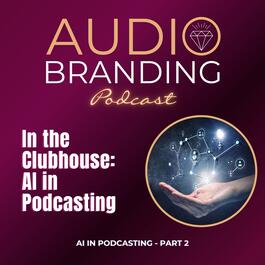
“I agree that humans will always want to work with humans and that we’re gonna always favor it in a lot of ways, especially because of the spontaneity, the creativity, the vibe. Kids love to use the word vibe, but we want the vibe and AI doesn’t have the vibe. Kids are really good at detecting AI, really good at it…. They pick it out way before their parents. So they’re really tuned into it. So I think that’s what’s going to keep it at bay in terms of being a true creative tool for really a long time.” – Sean Savage This episode is the second half of my Clubhouse discussion with voice actor and Sound Off Media Company owner Matt Cundill, Home Studio Mastery founder Junaid Ahmed, podcast producer and AR Media host Sean Savage, Spoken Life Media founder and Podcast Hall of Fame Inductee Rob Greenlee, and long-time podcaster and audio technology consultant George Whittam, as we discuss the future of AI, what sets machine and human learning apart, and building your own AI clone. As always, if you have questions for my panelists, you’re welcome to reach out through the links in the show notes. If you have questions for me, visit audiobrandingpodcast.com where you’ll find a lot of ways to get in touch. Plus, subscribing to the newsletter will let you know when the new podcasts are available and what the newest audio chats will be about. If you’re getting some value from listening, the best ways to show your support are to share this podcast with a friend and leave an honest review. Both those things really help – and I’d love to feature your review on future podcasts. (0:00:00) - AI and the Future of Technology The second half of our conversation begins as we talk about the impact of AI on everything from social media to politics, and what that might mean for its future. “I interviewed David Pogue earlier this year,” George says, “and he’s done a tremendous amount of AI research and experimenting, and he’s like, it hasn’t yet swung an election that we know of, so maybe we shouldn’t be too worried. But it’s just something to think about, and I think about it all the time.” The topic turns to AGI, or Artificial General Intelligence. “That day is coming,” Rob tells us. “I don’t know if it’s five years from now, ten years from now, that it surpasses, you know, the ability to think and process information, um, better than a human, but I think it’s coming and once that happens, it’s going to change everything.” (0:06:44) - Ethical Implications of AI Use We talk about the ethics of AI usage, and whether there’s any practical difference between how AI models are trained and how children naturally learn. “Even if your older brother is telling you ‘don’t copy me,’” Junaid notes, “guess what? Your younger siblings are still going to copy them. There’s no lawsuit against that. You know, that’s how human beings are literally taught.” George describes his experience with feeding an AI all his writing content to help it learn his writing style, and we discuss the prospect and legality of such AI ‘clones.’ “If you went and scraped pretty much all the work that you’ve done and voiced,” Matt says, “packaged it up to create an AI model, you then can own the licensing of that AI voice and be paid for it. But if somebody else went and did it, the answer would be no. But, as we’ve discussed, some people are out there doing it and saying ‘tough beans.’” (0:17:45) - AI Usage and Ethical Concerns The conversation turns from creating new content with AI to revisiting old content through the lens of machine learning. George talks about old recordings and the potential to restore them and add sound elements that have been...
From "Audio Branding"


Comments
Add comment Feedback